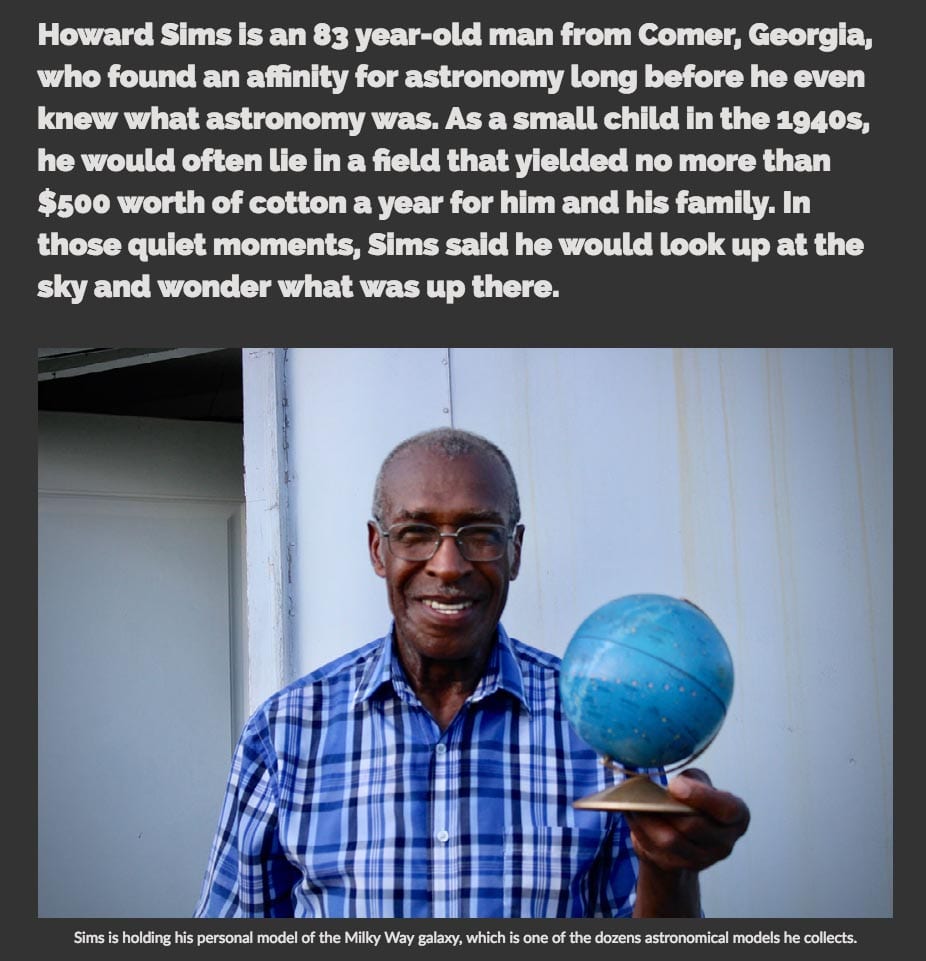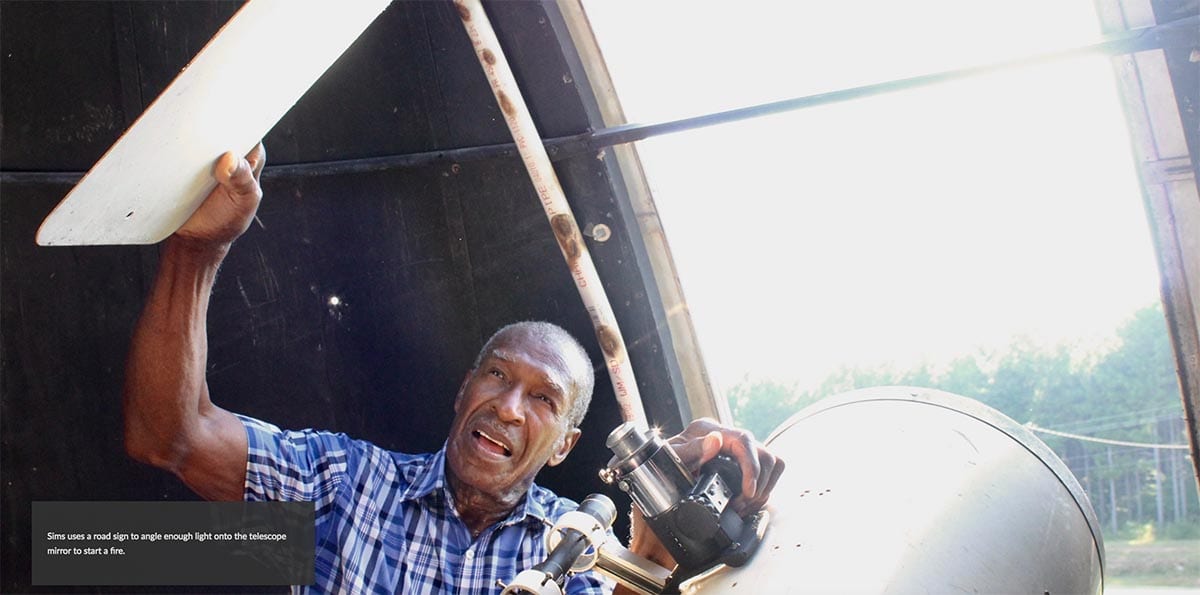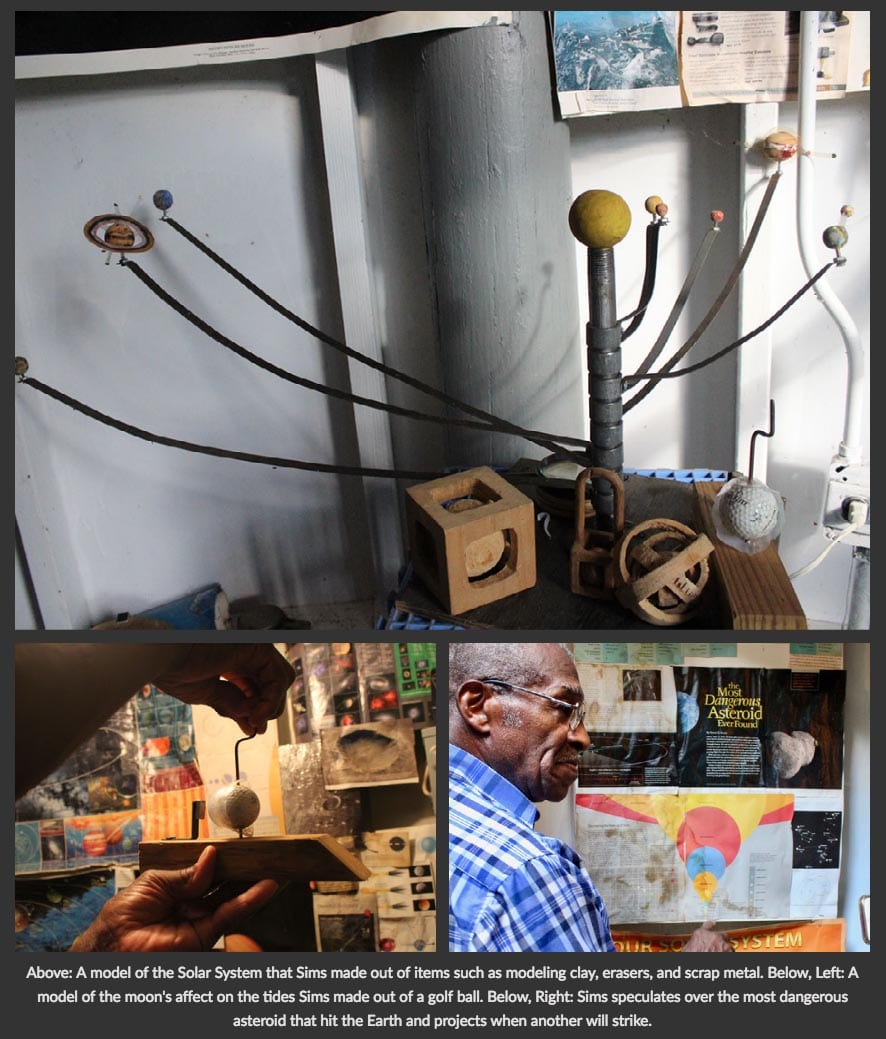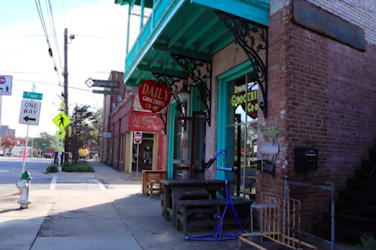ANNOTATION INSTRUCTIONS: When you see a light red highlight, click on the small comment box to the right to read the reporter’s annotation.
Astrophysicists are revered as some of the smartest people in the world. But can one be an astrophysicist without any formal education or training?
Georgian Howard Sims might say so. Sims has built a working observatory in his backyard, complete with two hand-crafted telescopes, without receiving any specialized education. The fruits of his labor were born from a simple desire to understand the sky.
Why It’s Newsworthy: Sims is also doing all of this as an 83 year old, when there are only 92 astronomers and physicists over the age of 80 in the United States.

Sims was 17 when he saw his first telescope after he and his family moved from Comer to Chicago. They visited the Alder Planetarium within his first month in the city.

Sims spent 66 years teaching himself about astronomy. At 83 he says he feels like he has seen almost all he can with his telescope. He now finds fulfillment in sharing his knowledge with others in the community.
“And that’s my dream: fish, show people the sky, work my wife’s flower beds, and have a garden where I can give the vegetables away,” Sims said.
Though Sims says he is fulfilled, he is still making plans. He hopes to create a simulation in his backyard that allows people to experience what it is like to grind mirrors.
“Yeah, I would like to do that before I die. If I ever die,” Sims joked.

His dream may sound simple to some. Sims started his life in the same location, and he plans on finishing it there, too. However, his choice to embrace questions and wonder within himself has brought Sims to an entirely new place.
Hannah Echols is a fourth year majoring in English and Journalism in the Grady College of Journalism at the University of Georgia.









Show Comments (12)
Grady Capstone Journalist
Though Sims says he is fulfilled, he is still making plans. How did reporting the story of George Sims affect Echols as a journalist?
“In two major ways: the first one is that everybody’s just looking for connection … what was really important to Sims was sharing it with somebody.”
And in “looking through the lens of his life,” Echols found her own reflection.
“He tried to understand everything, in ways that were hindering a sense of wonder and awe like I often try to do.”
Amanda Bright
Though Sims says he is fulfilled, he is still making plans. He hopes to create a simulation in his backyard that allows people to experience what it is like to grind mirrors.How did reporting the story of George Sims affect Echols as a journalist?
“In two major ways: the first one is that everybody’s just looking for connection … what was really important to Sims was sharing it with somebody.”
And in “looking through the lens of his life,” Echols found her own reflection. “He tried to understand everything, in ways that were hindering a sense of wonder and awe.”
Amanda Bright
Sims spent 66 years teaching himself about astronomy. At 83 he says he feels like he has seen almost all he can with his telescope. He now finds fulfillment in sharing his knowledge with others in the community.Hannah Echols said she decided to take photos on her first visit which was “difficult. I want them [sources] to realize I am engaged in their story. … Originally I thought I was going to do a video, but I felt like I had better images than video, and it was more conducive to time. I had in my mind to do visual first, and it helped me be concise and not add in all this information that would have taken away from the main point.”
Amanda Bright
Sims was 17 when he saw his first telescope after he and his family moved from Comer to Chicago. They visited the Alder Planetarium within his first month in the city.Hannah Echols: “For the first half, we sat at his kitchen table. I asked him very simple questions … I started out with, so, we will just start from the beginning: what made you want to build an observatory? … and he would just tell stories and tell stories. … I’d record it, then make note of the time when he said something important. At the end, I wrote out everything that stuck out in my memory … that’s how I began to organize.”
Amanda Bright
ANNOTATION INSTRUCTIONS: When you see a light red highlight, click on the small comment box to the right to read the reporter’s annotation.
Astrophysicists are revered as some of the smartest people in the world. But can one be an astrophysicist without any formal education or training?
Georgian Howard Sims might say so. Sims has built a working observatory in his backyard, complete with two hand-crafted telescopes, without receiving any specialized education. The fruits of his labor were born from a simple desire to understand the sky.
Why It’s Newsworthy: Sims is also doing all of this as an 83 year old, when there are only 92 astronomers and physicists over the age of 80 in the United States.
Sims was 17 when he saw his first telescope after he and his family moved from Comer to Chicago. They visited the Alder Planetarium within his first month in the city.
Sims spent 66 years teaching himself about astronomy. At 83 he says he feels like he has seen almost all he can with his telescope. He now finds fulfillment in sharing his knowledge with others in the community.
“And that’s my dream: fish, show people the sky, work my wife’s flower beds, and have a garden where I can give the vegetables away,” Sims said.
Though Sims says he is fulfilled, he is still making plans. He hopes to create a simulation in his backyard that allows people to experience what it is like to grind mirrors.
“Yeah, I would like to do that before I die. If I ever die,” Sims joked.
His dream may sound simple to some. Sims started his life in the same location, and he plans on finishing it there, too. However, his choice to embrace questions and wonder within himself has brought Sims to an entirely new place.
Hannah Echols is a fourth year majoring in English and Journalism in the Grady College of Journalism at the University of Georgia.
Hannah Echols: “For the first half, we sat at his kitchen table. I asked him very simple questions … I started out with, so, we will just start from the beginning: what made you want to build an observatory? … and he would just tell stories and tell stories. … I’d record it, then make note of the time when he said something important. At the end, I wrote out everything that stuck out in my memory … that’s how I began to organize.”
Grady Capstone Journalist
However, his choice to embrace questions and wonder within himself has brought Sims to an entirely new place.As for reporting skills, Echols said she learned more about being concise through this storytelling: “Knowing that sometimes less is more, which is really hard … it’s one of the most spontaneous stories I’ve done and also one of the best.”
Grady Capstone Journalist
ANNOTATION INSTRUCTIONS: When you see a light red highlight, click on the small comment box to the right to read the reporter’s annotation.
Astrophysicists are revered as some of the smartest people in the world. But can one be an astrophysicist without any formal education or training?
Georgian Howard Sims might say so. Sims has built a working observatory in his backyard, complete with two hand-crafted telescopes, without receiving any specialized education. The fruits of his labor were born from a simple desire to understand the sky.
Why It’s Newsworthy: Sims is also doing all of this as an 83 year old, when there are only 92 astronomers and physicists over the age of 80 in the United States.
Sims was 17 when he saw his first telescope after he and his family moved from Comer to Chicago. They visited the Alder Planetarium within his first month in the city.
Sims spent 66 years teaching himself about astronomy. At 83 he says he feels like he has seen almost all he can with his telescope. He now finds fulfillment in sharing his knowledge with others in the community.
“And that’s my dream: fish, show people the sky, work my wife’s flower beds, and have a garden where I can give the vegetables away,” Sims said.
Though Sims says he is fulfilled, he is still making plans. He hopes to create a simulation in his backyard that allows people to experience what it is like to grind mirrors.
“Yeah, I would like to do that before I die. If I ever die,” Sims joked.
His dream may sound simple to some. Sims started his life in the same location, and he plans on finishing it there, too. However, his choice to embrace questions and wonder within himself has brought Sims to an entirely new place.
Hannah Echols is a fourth year majoring in English and Journalism in the Grady College of Journalism at the University of Georgia.
How did reporting the story of George Sims affect Echols as a journalist?
“In two major ways: the first one is that everybody’s just looking for connection … what was really important to Sims was sharing it with somebody.”
And in “looking through the lens of his life,” Echols found her own reflection. “He tried to understand everything, in ways that were sometimes hindering a sense of wonder and awe.”
Echols said that is true of her reporting sometimes as well.
Grady Capstone Journalist
ANNOTATION INSTRUCTIONS: When you see a light red highlight, click on the small comment box to the right to read the reporter’s annotation.
Astrophysicists are revered as some of the smartest people in the world. But can one be an astrophysicist without any formal education or training?
Georgian Howard Sims might say so. Sims has built a working observatory in his backyard, complete with two hand-crafted telescopes, without receiving any specialized education. The fruits of his labor were born from a simple desire to understand the sky.
Why It’s Newsworthy: Sims is also doing all of this as an 83 year old, when there are only 92 astronomers and physicists over the age of 80 in the United States.
Sims was 17 when he saw his first telescope after he and his family moved from Comer to Chicago. They visited the Alder Planetarium within his first month in the city.
Sims spent 66 years teaching himself about astronomy. At 83 he says he feels like he has seen almost all he can with his telescope. He now finds fulfillment in sharing his knowledge with others in the community.
“And that’s my dream: fish, show people the sky, work my wife’s flower beds, and have a garden where I can give the vegetables away,” Sims said.
Though Sims says he is fulfilled, he is still making plans. He hopes to create a simulation in his backyard that allows people to experience what it is like to grind mirrors.
“Yeah, I would like to do that before I die. If I ever die,” Sims joked.
His dream may sound simple to some. Sims started his life in the same location, and he plans on finishing it there, too. However, his choice to embrace questions and wonder within himself has brought Sims to an entirely new place.
Hannah Echols is a fourth year majoring in English and Journalism in the Grady College of Journalism at the University of Georgia.
Hannah Echols took many photos on her first visit with Sims, but she said “it was difficult. I want them [sources] to realize I am engaged in their story. … Originally I thought I was going to do a video, but I felt like I had better images than video, and it was more conducive to time. I had in my mind to do visual first, and it helped me be concise and not add in all this information that would have taken away from the main point.”
Grady Capstone Journalist
ANNOTATION INSTRUCTIONS: When you see a light red highlight, click on the small comment box to the right to read the reporter’s annotation.
Astrophysicists are revered as some of the smartest people in the world. But can one be an astrophysicist without any formal education or training?
Georgian Howard Sims might say so. Sims has built a working observatory in his backyard, complete with two hand-crafted telescopes, without receiving any specialized education. The fruits of his labor were born from a simple desire to understand the sky.
Why It’s Newsworthy: Sims is also doing all of this as an 83 year old, when there are only 92 astronomers and physicists over the age of 80 in the United States.
Sims was 17 when he saw his first telescope after he and his family moved from Comer to Chicago. They visited the Alder Planetarium within his first month in the city.
Sims spent 66 years teaching himself about astronomy. At 83 he says he feels like he has seen almost all he can with his telescope. He now finds fulfillment in sharing his knowledge with others in the community.
“And that’s my dream: fish, show people the sky, work my wife’s flower beds, and have a garden where I can give the vegetables away,” Sims said.
Though Sims says he is fulfilled, he is still making plans. He hopes to create a simulation in his backyard that allows people to experience what it is like to grind mirrors.
“Yeah, I would like to do that before I die. If I ever die,” Sims joked.
His dream may sound simple to some. Sims started his life in the same location, and he plans on finishing it there, too. However, his choice to embrace questions and wonder within himself has brought Sims to an entirely new place.
Hannah Echols is a fourth year majoring in English and Journalism in the Grady College of Journalism at the University of Georgia.
Hannah Echols: “For the first half, we sat at his kitchen table. I asked him very simple questions … I started out with, so, we will just start from the beginning: what made you want to build an observatory? … and he would just tell stories and tell stories. … I’d record it, then make note of the time when he said something important. At the end, I wrote out everything that stuck out in my memory … that’s how I began to organize.”
Grady Capstone Journalist
But can one be an astrophysicist without any formal education or training?Hannah Echols: “I looked up what an observatory was, and then I researched to see if there were any record of handmade, homemade observatories.” When Echols found nothing, she decided that for the first of two interviews, she would just go in “with curiosity, which is helpful for profile pieces because you don’t go in with a bias or expecting to find something.”
Grady Capstone Journalist
Georgian Howard Sims might say so.Hannah Echols: “So, I called him on his home phone, and we talked for about 20 minutes. It was the owner of Normal Books who referred me to her friend who knew of him. … She said he was an older gentleman who built an observatory in his backyard.”
Amanda Bright
two hand-crafted telescopes, without receiving any specialized education. The fruits of his labor were born from a simple desire to understand the sky.Hannah Echols: “So, I called him on his home phone and we talked for about 20 minutes. It was the owner of Normal Books who referred me to her friend who knew of him. … She said he was an older gentleman who built an observatory in his backyard.”